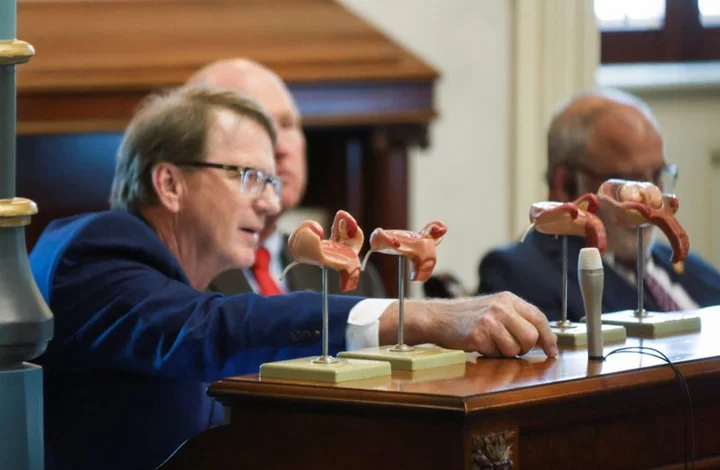A major branch of the US military does not have a Senate confirmed leader for the first time in more than a century, as a result of a Republican senator refusing to lift his block on military nominations.
Commandant of the Marine Corps Gen. David Berger relinquished command on Monday after holding a private retirement ceremony, after more than 40 years of service. His successor, Gen. Eric Smith, has not yet been confirmed to take over due to the hold on senior military nominations by Alabama Sen. Tommy Tuberville.
Speaking at Berger's relinquishment of command ceremony on Monday, Defense Secretary Lloyd Austin made a point to mention the hold and its impact on "stable and orderly leadership transitions," and military families.
"We have a sacred duty to do right by those who volunteer to wear the cloth of our nation," Austin said. "And I remain confident that all Americans can come together to agree on that basic obligation to those who keep us safe. I am also confident that the United States Senate will meet its responsibilities. And I look forward to welcoming an outstanding new commandant for our Marine Corps, and to adding many other distinguished senior leaders across the joint force."
Berger agreed just moments later, saying "we need the Senate to do their job so we can have a sitting Commandant that's appointed and confirmed."
"We need that house to be occupied," Berger said in reference to the Commandant's house. "We ask the Senate to do that."
In his last interview as commandant, Berger argued military officers should be left out of the hold, which is being maintained as a protest of Pentagon reproductive health policies announced earlier this year.
"This needs to get resolved," Berger told CNN. "We need to leave the military out of the politics of it. The whole department -- the military people wearing a uniform, should not be drug into an issue that's a policy issue, for which we don't deal with ... The military uniform people that we want left out [of] politics are being dragged into it, and that's not healthy at all."
Democratic Sen. Jack Reed, chairman of the Senate Armed Services Committee, told CNN that denying Smith's promotion "in this partisan manner is an insult to the Marine Corps and every service member."
"Gen. Smith has faithfully served the country for 36 years," Reed said. "He has fought and bled in our nation's wars and led fellow marines with courage, honor, and distinction. He earned this promotion. He deserves Senate action without political obstruction that has nothing to do with his command."
Smith has the authority to act as the commandant in his current role as the assistant commandant. Maj. Jim Stenger, a spokesman for the Marine Corps, said Smith will remain the assistant until he is confirmed by the Senate.
Smith will have the authorities he needs to do the job, Berger said, but he'll be left without a second-in-command to assist him because of the hold.
"He can't do both jobs at the same time, nor can anyone else because they don't have the authorities because all the promotions are held up," Berger said. "So he's going to have to do his job in a very different way than I was able to, because I could travel, he was here, he could travel, I was here. Now only one of him, so it affects the way he does his job."
More than 200 nominations are currently stalled
Smith is one of more than 200 general and flag officers whose nominations are currently stalled in the Senate due to a hold led by Tuberville over his protest of new Pentagon reproductive health policies.
Defense officials expect more than 600 senior officers to be up for nomination by the end of the year.
Typically, those nominations are approved in a routine process known as unanimous consent, which approves hundreds of nominations at once. Tuberville's hold prevents that, meaning the Senate would need to take a vote on each nomination individually -- a process one Democratic Senate aid previously told CNN would take months to complete.
In the last few months, Berger said, he's had to do something he "never thought I would have to do as a service chief: tell people who had already served 30 years, and their family has served 30 years ... I'd like you to think about not retiring."
"These are families who have already done this for 30 years," he said. "They've given up a lot in those 30 years, and I'm asking them would they be willing to stay longer, indefinitely."
Indeed, Smith is far from the only senior Marine Corps officer to be impacted by the holds. Among the other positions are the commanders of the I and III Marine Expeditionary Forces. Both are positions held by three-star generals, but could be temporarily filled by a one-star if their successors aren't confirmed by the Senate.
Smith raised concerns about I Marine Expeditionary Force commander slot being filled by a one-star in his Senate confirmation hearing in June. In response to a question from independent Maine Sen. Angus King, Smith said that if the current commander did not have a confirmed replacement by the time he retires in August, a "fairly new" one-star general would be "in charge of that 48,000-person Marine Expeditionary Force."
"And that compromises readiness and decision making and the effectiveness of that division?" King asked.
"Sir, it does," Smith responded.
Outside of questions about how a lasting hold would impact internal military processes, officials have also raised concerns about the message the hold projects to allies and adversaries alike.
Berger told CNN it would be "naïve to think that the US military isn't considered a world leader, and when the world leader can't promote its officers on a regular basis -- kind of like when [you] can't pass a budget -- confidence goes down."
"I won't be surprised if confidence [is] affected by that," he said.
A Marine official who spoke on condition of anonymity pointed to the III Marine Expeditionary Force commander slot, saying that the general officer in that position regularly meets with important allies and partners in the Pacific. The official said it would be "embarrassing" for the US to send a one-star, acting commander to meet with more senior ranking foreign allies in a region that is so critical for the Pentagon.
"It wouldn't be a good look for a key ally to be meeting with a one-star," the official said.
'Public relations gift' to China
Democratic Rep. Jake Auchincloss of Massachusetts, a member of the House Select Committee on Strategic Competition Between the US and China, told CNN that Tuberville's hold is playing into China's hands.
Chinese President Xi Jinping's "core message is the United States, specifically and the West broadly, are in decline and dysfunction," Auchincloss said.
"It's one guy who is single handedly handing a public relations gift to Xi Jinping," he added. "It's especially unfortunate, because we've actually had a lot of success recently on our military posture in the Indo-Pacific ... And as we're doing this pivot to Asia, pivot to the Indo-Pacific maybe more precisely, we're stubbing our toe because of Tommy Tuberville."
Though the policies included things like extending the timeline for service members to have to notify commanders of a pregnancy, and travel allowances for troops seeking in vitro fertilization (IVF) and intrauterine insemination (IUI), they also included a travel allowance for service members seeking an abortion.
"Our service members and their families do not control where they are stationed, and due to the nature of military service, are frequently required to travel or move to meet operational requirements," a February news release announcing the new policies said. "The efforts taken by the Department today will ... ensure service members are able to access non-covered reproductive health care regardless of where they are stationed."
Tuberville "believes the Pentagon is circumventing the role of Congress and flouting existing federal law, which narrowly restricts the use of taxpayers funds" for abortions, a news release from his office said. Under current law, the Defense Department cannot pay for abortions unless the health of the mother is at risk, or if the pregnancy is the result of rape or incest.
Those three cases remain the only instances in which Pentagon facilities can provide an abortion.
Ultimately, Berger echoed concerns from other DOD officials about the impact an ongoing hold would have on the military's readiness and warfighting capabilities.
He said the holds put the Marine Corps in "a risky place, because from a warfighting perspective, you want the most experienced, most proficient leader commanding that organization," and in some cases a less experienced leader will be in charge.
"You want the very best leaders day-to-day leading those organizations, training those Marine units, getting them ready for whenever a conflict comes. So day-to-day, increase risk, because we don't have the right person in the right job because I can't promote them," Berger said. "The second part is in a conflict or in a crisis or a war, same thing — people's lives are at stake. You want the very best person in position. I can't do that right now."









